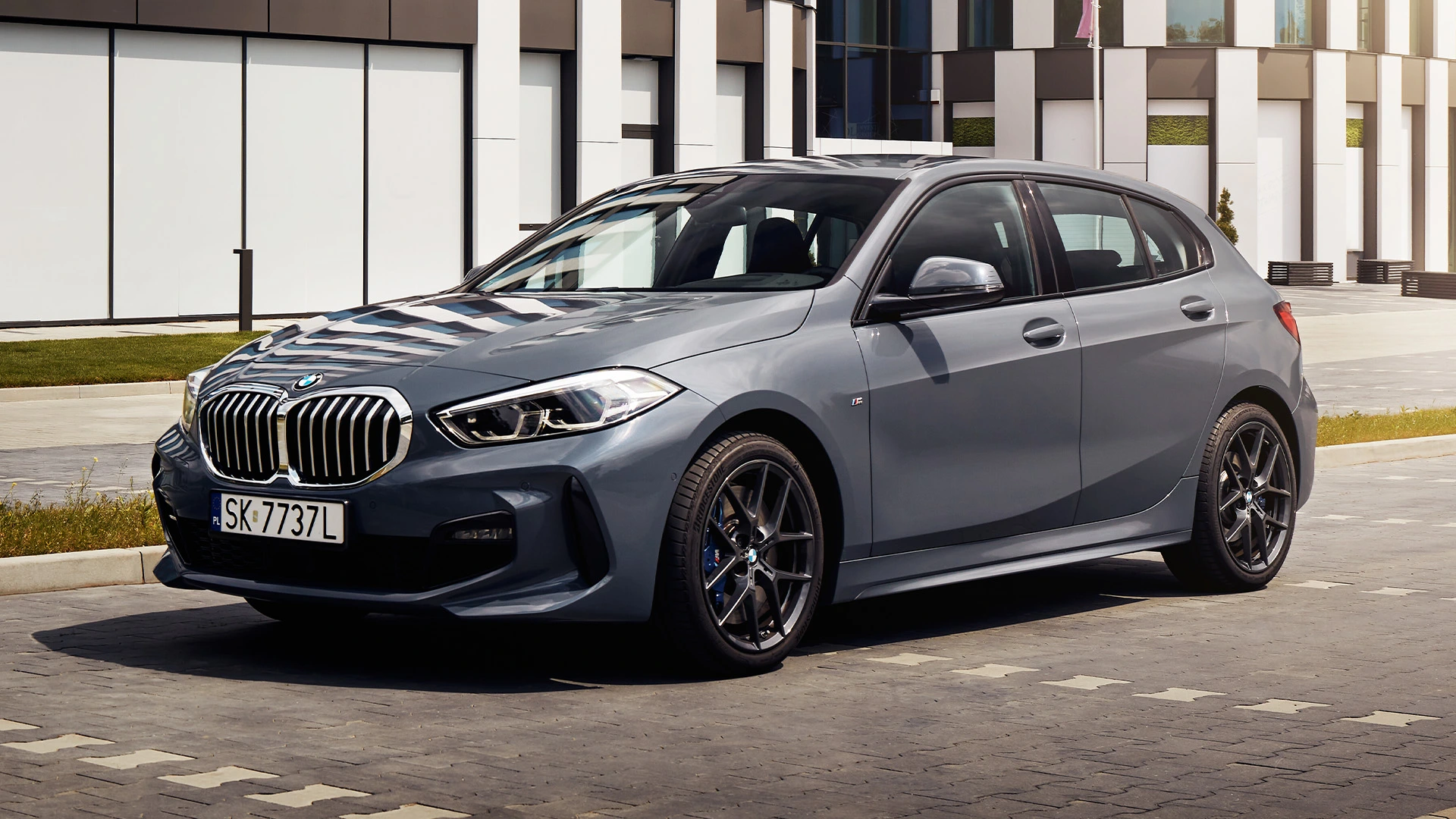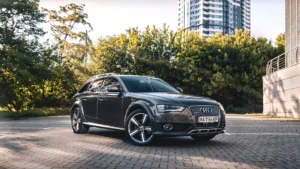If you have a budget of £200 per month for car finance, you’ll be pleasantly surprised by the range of quality vehicles available to you. From practical hatchbacks to premium sedans, this price point opens doors to impressive options that don’t require compromising on reliability, features, or driving enjoyment.
However, finding the right car at this budget requires navigating several challenges. Many budget-conscious buyers fear ending up with unreliable vehicles that cost more in repairs than they save in monthly payments.
Our comprehensive guide addresses these concerns by identifying vehicles that offer the best combination of reliability, value, and quality at under £200 monthly. We’ve analysed reliability data, depreciation rates, and real-world maintenance costs to ensure these recommendations won’t leave you facing unexpected expenses that stretch your budget beyond breaking point.
Each recommendation includes typical PCP finance terms based on 10% deposit (£1,000), 48-month term, 18.9% representative APR, and estimated final payment.
With careful selection and reasonable expectations, a £200 monthly budget can secure a vehicle that delivers reliability, practicality, and even a touch of luxury – without the financial anxiety that often accompanies budget car buying.
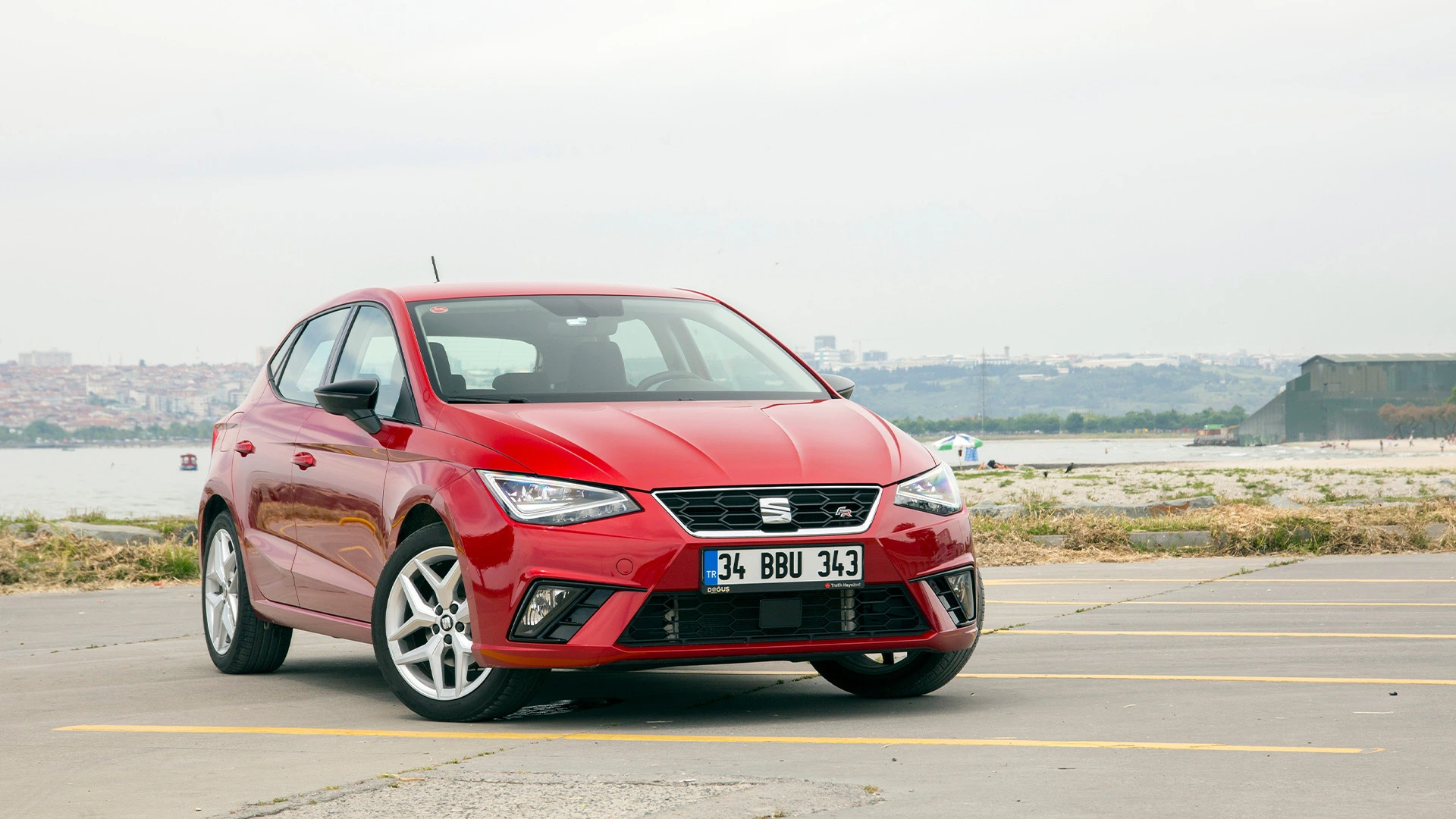
1. Seat Ibiza (2017-Present)
Premium Feel with Low Finance Costs
The fifth-generation Seat Ibiza offers impressive value for finance-conscious buyers, with monthly payments starting around £140-180. Despite its compact dimensions, it delivers class-leading practicality and driving enjoyment while maintaining strong residual values – a crucial factor when financing to avoid the negative equity trap.
Unlike many rivals that quickly depreciate, the Ibiza holds its value well, protecting you from owing more than the car is worth if circumstances change during your finance term. This advantage, combined with its excellent real-world fuel economy of 52.3mpg from the recommended 1.0 TSI engine, keeps both monthly payments and running costs predictable.
The Ibiza’s surprising interior space rivals cars from the class above, with genuine room for four adults and a generous 355-liter boot capacity. This eliminates the need to upgrade to a more expensive vehicle as your needs evolve – a significant consideration when managing tight finances under the £200 monthly threshold.
Key Benefits for Finance Buyers
- Strong residual values: Holds value better than many alternatives, reducing negative equity risk
- Impressive standard equipment: Even SE models include touchscreen infotainment and air conditioning
- Low insurance costs: Groups 8-12 keep premiums manageable for younger drivers
- Five-star safety rating: Standard autonomous emergency braking helps reduce insurance costs
For the smartest finance deal, focus on the turbocharged 1.0 TSI 95PS engine in either SE Technology or FR trim. These models provide the best balance of performance, equipment, and value while keeping monthly payments comfortably under £200. Avoid the entry-level 1.0 MPI 80PS that can feel underpowered in daily driving.
Finance Warning Signs:
- Hidden balloon payments: Some attractive monthly deals conceal substantial final payments – always check the GMFV before signing.
- Interest rate variance: The most competitive deals offer around 7.9% APR, while some exceed 12% – potentially adding thousands to your total cost.
- Service history importance: Verify comprehensive maintenance records to avoid costly repairs during your finance term.
- Warranty coverage: Prioritise examples with remaining manufacturer warranty for valuable peace of mind.
- PCP flexibility: Consider Personal Contract Purchase for lower monthly costs and the option to return the car if reliability issues develop.
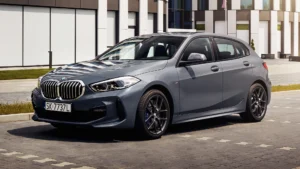
2. BMW 1 Series (2011-2019)
Premium Badge with Outstanding Reliability
The second-generation BMW 1 Series offers budget-conscious finance buyers the opportunity to access premium German engineering from just £5,000, or approximately £140-£190 monthly on finance. As the only rear-wheel-drive car in its class during this period, it delivers a driving experience that feels genuinely special compared to mainstream alternatives.
What particularly sets the 1 Series apart for finance buyers is its exceptional reliability record combined with strong residual values. Unlike many premium brands that can suffer expensive failures, the 1 Series consistently ranks highly in reliability surveys, protecting you from budget-breaking repair costs while making monthly payments. This reliability also helps maintain stronger resale values, reducing the risk of negative equity if circumstances change.
The wide engine range offers genuine choices to suit different financial priorities, from the supremely economical 116d (achieving up to 78.5mpg) that dramatically reduces fuel costs, to the smooth and sprightly 118i petrol that balances performance with 56.5mpg efficiency. This flexibility allows you to align running costs precisely with your monthly budget constraints.
Key Benefits for Finance Buyers
- Terrific reliability record: Consistently high rankings in reliability surveys, reducing unexpected repair costs
- Premium badge appeal: Enjoy the prestige of BMW ownership without stretching beyond £200 monthly
- Exceptional fuel economy: Diesel models achieving up to 78.5mpg significantly reduce monthly running costs
- Class-leading infotainment: BMW’s intuitive iDrive system remains superior to many newer rivals
For finance buyers specifically, we recommend the 118i SE as the sweet spot in the range. The efficient yet responsive 1.5-liter engine (shared with MINI) delivers enjoyable performance without compromising economy, while the SE trim provides essential equipment without pushing monthly payments beyond the crucial £200 threshold. Avoid heavily optioned M Sport models that command higher premiums without adding proportionate value.
Smart Buyer Considerations:
- Mileage verification: Many were company cars, so check service history carefully and prioritise below-average mileage examples.
- Post-2015 facelift advantages: Updated models feature more efficient engines and enhanced technology.
- Transferable service plans: Check if remaining BMW service plan coverage exists, significantly reducing maintenance costs.
- Rear space limitations: Slightly restricted rear legroom means this works best for couples or families with younger children.
- Road tax implications: Models registered after April 2017 incur the flat-rate £180 annual fee regardless of emissions.

3. Suzuki Swift (2017-2024)
Fun to Drive with Impressive Economy
The Suzuki Swift offers a nearly perfect blend of driving enjoyment, low running costs and practical space that makes it an ideal choice for new drivers and finance-conscious buyers. With used examples starting from just £6,000, or approximately £120-£170 monthly on finance, it provides exceptional value while keeping well within the crucial £200 threshold.
What makes the Swift particularly appealing for those on a tight budget is its remarkable fuel efficiency. The current 1.2-litre mild-hybrid delivers up to 59.2mpg in real-world driving, dramatically reducing your weekly fuel expenses compared to many alternatives. This ongoing saving makes a substantial difference to monthly budgets already stretched by finance payments.
Unlike many small cars that feel cramped and basic, the Swift offers impressive interior space with enough room for adults in both front and rear seats. This eliminates the need to upgrade to a larger, more expensive vehicle as your circumstances change – a crucial consideration when managing finance commitments over several years.
Key Benefits for Finance Buyers
- Exceptional running costs: Class-leading fuel economy of up to 59.2mpg significantly reduces monthly outgoings
- Fun driving experience: Light weight and responsive handling make every journey enjoyable, unlike many budget alternatives
- Practical interior space: Surprisingly roomy cabin accommodates adults in both rows despite compact exterior dimensions
- Standard safety equipment: All models include autonomous emergency braking and adaptive cruise control
For those balancing monthly finance payments with everyday practicality, we recommend focusing on the mid-range SZ-T trim. This provides the essential 7-inch touchscreen with Apple CarPlay/Android Auto integration, rear parking sensors and alloy wheels, while avoiding unnecessary features that would push payments beyond the £200 mark.
Finance Considerations:
- Strong reliability record: Suzuki’s reputation for dependability reduces the risk of unexpected repair costs during your finance term.
- Competitive insurance costs: Lower insurance groups compared to many rivals keep annual premiums affordable.
- Service Payment Plans: Suzuki offers flexible servicing plans that allow you to spread maintenance costs over time.
- Limited boot space: The 265-litre boot is smaller than some rivals, which might necessitate occasional hiring of larger vehicles.
- Firm ride quality: The sporty suspension that makes the Swift fun to drive can feel bumpy on poor road surfaces.
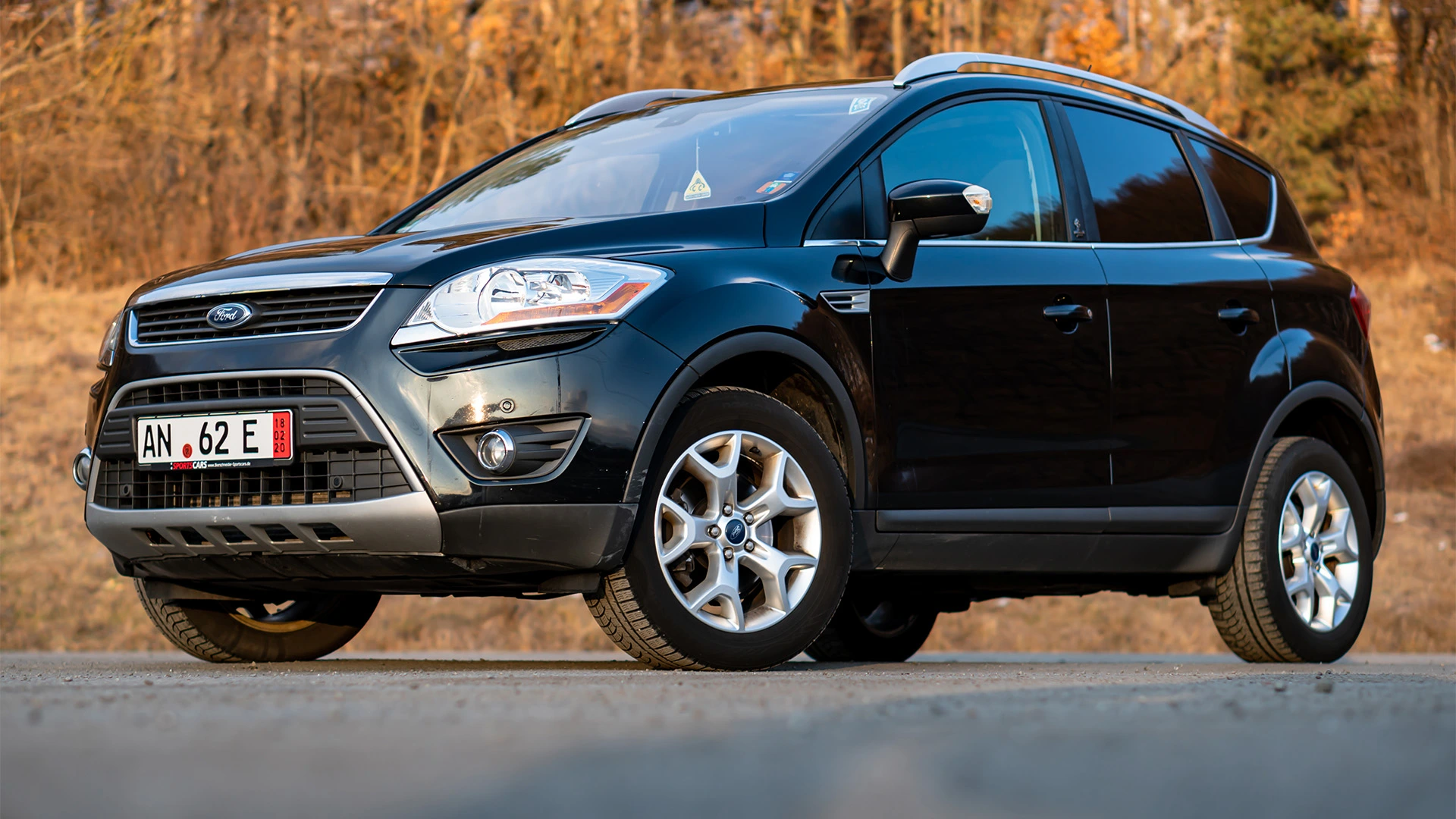
4. Ford Kuga (2013-2020)
Our First SUV Choice: Family Space with Hatchback Handling
The Ford Kuga represents an excellent opportunity for finance buyers to step up to a proper family SUV without breaking the £200 monthly threshold. With used examples from under £6,000, or approximately £140-£190 on finance, it delivers impressive value while offering significantly more space and versatility than conventional hatchbacks.
What particularly sets the Kuga apart from other affordable SUVs is its impressive driving dynamics. Unlike many rivals that feel cumbersome and top-heavy, the Kuga handles with the agility and precision of a much smaller car, making it genuinely enjoyable on British country roads. This driving pleasure doesn’t come at the expense of comfort, with the suspension effectively absorbing larger bumps and potholes.
For finance-conscious buyers, the Kuga’s economical diesel engines provide crucial running cost advantages. The 1.5 TDCi achieves an impressive 54.3mpg, while even the more powerful 2.0 TDCi returns 47.9mpg – helping to keep your total monthly outgoings predictable when combined with finance payments.
Key Benefits for Finance Buyers
- SUV practicality with hatchback handling: Enjoy family-friendly space without sacrificing driving enjoyment
- Strong diesel economy: The 1.5 TDCi’s 54.3mpg helps offset monthly finance payments with reduced fuel costs
- Comprehensive equipment levels: Even entry-level Zetec models include air conditioning, electric windows and cruise control
- Affordable servicing costs: Ford’s Essentials servicing starts at just £169 once outside warranty
For the optimal balance of value and features, we recommend the 1.5 TDCi in Zetec trim. This combination delivers the strongest fuel economy while avoiding unnecessary features that would push monthly payments beyond the £200 threshold. If your budget allows, look for examples fitted with the optional 8.0-inch touchscreen infotainment system for improved connectivity.
Smart Buyer Considerations:
- Prioritise models from 2016 onwards: These benefit from the improved 1.5-litre engines replacing the earlier 1.6-litre units.
- Verify complete service history: Regular maintenance is essential for diesel particulate filter health, especially in predominantly urban use.
- Check interior quality carefully: Some examples show premature wear on frequently used surfaces.
- Consider front-wheel drive versions: These offer better fuel economy and lower maintenance costs than 4WD models.
- Road tax implications: Models registered after April 2017 incur the flat-rate £190 annual fee regardless of emissions.
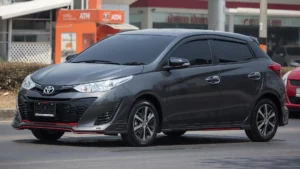
5. Toyota Yaris (2011-2020)
Legendary Reliability with Hybrid Option
The Toyota Yaris offers peace of mind that’s almost impossible to match when managing tight monthly car finance payments. With used examples starting from just £3,000, or approximately £100-£160 monthly on finance, it provides exceptional long-term value while keeping comfortably within the £200 threshold.
What particularly sets the Yaris apart for finance buyers is its extraordinary reliability record. Unlike many budget alternatives that can develop costly faults, the Yaris consistently ranks at the top of dependability surveys, dramatically reducing the risk of unexpected repair bills that could derail carefully planned monthly budgets. This reliability advantage becomes even more significant when financing, as you won’t face the double burden of monthly payments alongside garage bills.
The Yaris stands uniquely in its class by offering a proper hybrid option that can achieve an incredible 80.7mpg, significantly reducing your weekly fuel expenses. For urban drivers especially, this translates to substantial savings that help offset monthly finance costs. The hybrid can even run on electric power alone for short distances – a feature missing from alternatives with milder hybrid systems.
Key Benefits for Finance Buyers
- Unmatched reliability: Consistently excellent dependability protects against unexpected repair costs during finance term
- Class-exclusive hybrid option: Up to 80.7mpg reduces running costs dramatically compared to conventional alternatives
- Toyota 5+ club membership: 20% discount on servicing and MOT costs once your car is over five years old
- Practical interior space: Surprisingly spacious cabin with flat rear floor accommodates five adults for short journeys
For those balancing strict monthly budgets with practical needs, we recommend focusing on the 1.3-litre petrol in TR or Icon trim. This combination delivers excellent reliability with adequate performance, avoiding the lacklustre acceleration of the 1.0-litre engine. The hybrid makes financial sense primarily for urban drivers who can take advantage of its low-speed electric capability.
Finance Considerations:
- Strong residual values: Toyota’s reputation helps maintain value, reducing negative equity risk during your finance term.
- Ultra-low repair frequency: Significantly fewer mechanical issues than European alternatives, protecting your monthly budget.
- London ULEZ compliance: Hybrid models are exempt from Ultra Low Emission Zone charges, important for city dwellers.
- Limited boot space: At 286 litres (less in hybrid models), the boot is smaller than some rivals, potentially requiring occasional hiring of larger vehicles.
- Basic technology: The touchscreen system feels dated compared to rivals, though Apple CarPlay/Android Auto was added in later models.
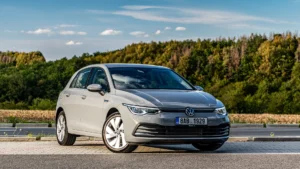
6. Volkswagen Golf (2013-2020)
Premium Quality with Affordable Running Costs
The Volkswagen Golf offers the perfect compromise for budget-conscious buyers who crave premium quality without the premium price tag. With used examples starting from just £5,000, or approximately £130-£190 monthly on finance, it delivers sophisticated driving dynamics, upmarket interior quality and impressive efficiency while staying within the crucial £200 threshold.
What particularly distinguishes the Golf from similarly priced alternatives is its class-leading refinement and comfort. The supple suspension smooths out poor British road surfaces more effectively than nearly all competitors, while excellent sound insulation creates a relaxing driving environment – qualities typically associated with much more expensive vehicles.
For finance buyers concerned about running costs, the Golf’s efficient engine range provides crucial advantages. The 1.6 TDI 105 achieves an impressive 74mpg (NEDC) or 55-60mpg in real-world driving, while even the responsive 1.4 TSI petrol returns 57mpg officially. These genuine efficiency benefits help keep your total monthly outgoings predictable when combined with finance payments.
Key Benefits for Finance Buyers
- Premium driving experience: Sophisticated ride quality and refinement typically found in much pricier cars
- Efficient engine range: Excellent real-world economy from both petrol and diesel options
- Strong residual values: The Golf holds its value better than many mainstream rivals, reducing negative equity risk
- High-quality interior: Premium materials and intuitive ergonomics that withstand years of use without deteriorating
For the optimal balance of performance, economy and value, we recommend the 1.4 TSI 125 in SE or Match trim (or the later 1.5 TSI Evo 130 for post-2017 models). This combination delivers responsive performance and excellent efficiency while providing all essential features without unnecessary extras that would push payments beyond £200 monthly.
Finance Considerations:
- Low road tax liability: Most pre-April 2017 models fall into either the £20 or £30 tax band, reducing annual outgoings.
- Insurance group advantages: Lower insurance groups than premium-badged alternatives help keep policy costs manageable.
- Reasonable servicing costs: While not as cheap as Ford or Vauxhall, Volkswagen servicing remains competitive with fixed-price options.
- Seek post-2017 ‘Mk7.5’ models: If budget allows, these feature improved infotainment and more efficient engines.
- Higher initial purchase price: The Golf costs slightly more than like-for-like mainstream rivals, but this gap narrows on finance.
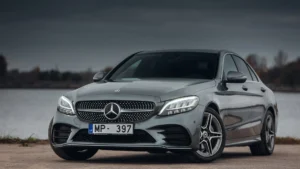
7. Mercedes C-Class (2014-2021) – Our First Saloon Choice
Prestigious Badge with Surprising Affordability
The Mercedes C-Class represents a remarkable opportunity for finance-conscious buyers to access genuine luxury without exceeding the £200 monthly threshold. With used examples starting from just under £9,000, or approximately £170-£200 on finance, it delivers the prestige and comfort of a premium German saloon at mainstream pricing levels.
As our first saloon choice, the C-Class stands out from family hatchbacks with its elegant profile and commanding road presence. The three-pointed star on the bonnet delivers instant status that lesser badges simply cannot match – an important consideration for those who need to make a positive impression for business or personal reasons.
For buyers concerned about running costs alongside finance payments, the C-Class offers impressively economical engines. The popular C220d achieves up to 70.6mpg in official tests (55.4mpg under the newer WLTP standards), helping to offset the slightly higher monthly payments compared to mainstream alternatives with significant fuel savings.
Key Benefits for Finance Buyers
- Prestigious brand image: Enjoy the status of Mercedes ownership without the expected financial burden
- Exceptional comfort: Superior ride quality and refinement create a genuinely premium driving experience
- Comprehensive equipment: Even entry-level SE trim includes climate control, reversing camera and collision prevention
- Advanced safety features: Class-leading protection helps reduce insurance costs despite the premium badge
For the optimal balance of performance, economy and value, we recommend focusing on the C220d in Sport trim, ideally with the Premium pack if your budget allows. This combination delivers responsive performance and excellent efficiency while providing key luxury features without pushing monthly payments significantly beyond £200.
Smart Buyer Considerations:
- Verify comprehensive service history: Mercedes engines require diligent maintenance to prevent costly issues.
- Consider independent specialists: Main dealer servicing can be expensive, but quality independents offer significant savings.
- Check for outstanding recalls: The C-Class has had several recalls that should have been addressed.
- Beware luxury car tax: Models costing over £40,000 new attract an additional £410 annual tax years 2-6.
- Investigate monthly service plans: Mercedes offers payment plans that spread maintenance costs to align with finance payments.
While the C-Class may require more careful budgeting than mainstream alternatives, the combination of prestige, comfort and driving pleasure delivers a genuine premium experience at an accessible monthly cost. The key is selecting the right specification and understanding the slightly higher maintenance requirements to ensure your ownership experience matches your expectations.
8. Audi A4 (2015-2024)
Premium Saloon with Class-Leading Comfort
The Audi A4 offers another premium badge option for finance-conscious buyers, with used examples starting from around £10,000, or approximately £170-£200 monthly on finance. What Car?’s 2016 Car of the Year remains the class leader for interior quality, refinement and comfort even years after its launch.
What particularly distinguishes the A4 from its rivals is its exceptional motorway refinement. Wind and road noise are remarkably well suppressed, creating a serene driving environment that makes long journeys significantly less tiring – a crucial benefit for those who regularly commute or travel for work while managing monthly finance payments.
For buyers concerned about running costs alongside finance commitments, the A4’s efficient diesel engines provide significant advantages. The 2.0 TDI Ultra achieves up to 74mpg in official tests (50-60mpg in real-world driving), while emitting less than 100g/km of CO2. This exceptional economy helps keep total monthly outgoings predictable when combined with finance payments.
Key Benefits for Finance Buyers
- Class-leading interior quality: Premium materials and exceptional build quality that withstand years of use
- Comprehensive standard equipment: Even entry-level SE/Technik models include xenon headlights, parking sensors and autonomous braking
- Excellent economy from diesels: Up to 74mpg (NEDC) or 55mpg (WLTP) significantly reduces monthly running costs
- Spacious interior: More rear space than the BMW 3 Series and Mercedes C-Class for family practicality
For the optimal balance of equipment, economy and monthly payments, we recommend the 2.0 TDI 35 in SE/Technik trim. This combination delivers excellent efficiency while providing all essential features without unnecessary extras that would push payments beyond the £200 threshold. Avoid the larger-wheeled S line models unless fitted with adaptive suspension, as the ride can be unnecessarily firm.
Finance Considerations:
- Strong residual values: The A4 maintains value better than many alternatives, protecting against negative equity.
- S Tronic gearbox servicing: Ensure automatic models have had fluid changes every 38,000 miles to avoid costly repairs
- Fixed-price servicing plans: Audi offers competitive plans for cars over three years old (£190 interim/£360 major)
- Beware luxury car tax: Models originally costing over £40,000 attract an additional £410 annual tax between years 2-6.
- Electronic reliability concerns: Some owners report issues with warning lights and infotainment systems.
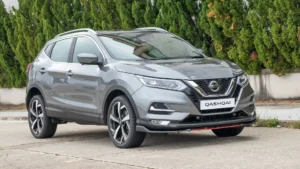
9. Nissan Qashqai (2014-2021)
The Original Crossover with British-Built Quality
The Nissan Qashqai remains the benchmark family SUV that started the crossover revolution, with used examples starting from just £5,000, or approximately £110-£190 monthly on finance. This former What Car? Car of the Year winner continues to deliver an impressive blend of practicality, comfort and efficiency while staying comfortably within the £200 monthly threshold.
What particularly distinguishes the Qashqai from other affordable SUVs like the Citroen C3 is its exceptional ride comfort. Developed specifically for British roads, it smooths out potholes and broken surfaces more effectively than most rivals, creating a relaxed driving experience that makes family journeys significantly more pleasant – a crucial consideration when managing both finance payments and family needs.
For buyers concerned about running costs alongside finance commitments, the Qashqai’s efficient diesel engines provide significant advantages. The popular 1.5 dCi achieves an impressive 74.3mpg in official tests (at least 50mpg in real-world driving), while emitting just 99g/km of CO2. These economy benefits help offset monthly finance payments with reduced day-to-day expenses.
Key Benefits for Finance Buyers
- Exceptional ride comfort: UK-developed suspension delivers premium-level ride quality on British roads
- Practical boot features: Ingenious divider system on Acenta models and above creates flexible storage options
- Impressive fuel economy: The 1.5 diesel achieves 50+ mpg in real-world driving, reducing monthly outgoings
- Five-star Euro NCAP safety: Comprehensive protection for family transport with minimal insurance costs
For the optimal balance of equipment, economy and value, we recommend the 1.5 dCi in Acenta trim for earlier models, or the 1.3 DIG-T 140 petrol in Acenta for post-facelift cars. These combinations deliver excellent efficiency while providing essential features like dual-zone climate control, alloy wheels and the versatile boot dividers without pushing monthly payments beyond the £200 mark.
Finance Considerations:
- Avoid top-spec Tekna models: Their 19-inch wheels compromise the otherwise excellent ride quality.
- Consider service plans: Servicing costs (£229 petrol/£269 diesel) can be spread to align with monthly payments.
- Verify air conditioning health: Some owners report systems requiring regassing earlier than expected.
- Post-2017 facelift advantages: Later models benefit from improved interior quality and updated engines.
- Restricted rear visibility: Prioritise examples with parking sensors or reversing cameras.
While some owners report reliability niggles, particularly with electronics and air conditioning systems, the Qashqai’s combination of family-friendly space, excellent comfort and efficient engines makes it an intelligent choice for budget-conscious buyers seeking SUV practicality without the typically associated costs.
10. Vauxhall Astra (2015-2021)
Exceptional Value with Premium Features
The Vauxhall Astra represents the true budget champion of our list, with used examples starting from just £5,000, or approximately £100-£160 monthly on finance. This European Car of the Year winner delivers remarkable equipment levels and spacious practicality at bargain prices that make it accessible even to those with the tightest finance constraints.
What particularly distinguishes the Astra from similarly priced alternatives is its impressive fuel economy. The 1.6-litre ecoTEC diesel achieves an outstanding 85.6mpg in official tests, while even the spirited 1.0-litre three-cylinder petrol returns 62.8mpg. These significant efficiency advantages help to offset monthly finance payments with reduced day-to-day running costs.
Unlike previous generations, this seventh-generation Astra is genuinely enjoyable to drive, with a more responsive feel and a significant weight reduction that improves both handling and economy. The car’s lighter structure and improved suspension provide a comfortable ride that smooths out at higher speeds, creating a refined driving experience typically associated with more expensive vehicles.
Key Benefits for Finance Buyers
- Exceptional depreciation advantage: Heavy initial depreciation means second-hand buyers get remarkable value
- Comprehensive equipment levels: Even entry-level Design models include touchscreen infotainment, cruise control and air conditioning
- Class-leading economy options: The 85.6mpg ecoTEC diesel significantly reduces monthly fuel expenses
- Affordable servicing costs: Competitive servicing plans starting from just £15 monthly for cars over 10 months old
For the optimal balance of performance, economy and value, we recommend the 1.0-litre 104bhp three-cylinder petrol in SRi Nav trim. This combination delivers responsive performance and excellent efficiency while providing premium features like satellite navigation and sports styling without pushing monthly payments beyond £160.
Finance Considerations:
- Mixed reliability reports: Some owners experience electronics issues, particularly with infotainment systems.
- Variable dealer service quality: Experiences with Vauxhall dealers can be inconsistent, affecting warranty repairs.
- Annual servicing requirement: Regular maintenance essential at yearly/20,000-mile intervals.
- Low insurance costs: Groups 6-14 for most models keep insurance policy expenses manageable.
- Diesel particulate filter concerns: Ensure diesel models have been regularly driven at highway speeds.
While the Astra may lack the premium badge appeal of some rivals, it compensates with exceptional value and equipment levels that would cost thousands more in alternatives. The key to a successful ownership experience is selecting the right specification and ensuring thorough pre-purchase checks to identify any potential electronic gremlins.
PCP vs Car Leasing: Which is Best for a £200 Budget?
With a £200 monthly budget, PCP typically offers better long-term value and flexibility than leasing. PCP allows you to either return the car, buy it outright via the balloon payment, or use potential equity towards your next vehicle – options not available with leasing.
While leasing might secure a higher-spec car initially for £200 monthly, you’re locked into returning it with no ownership possibility. PCP provides better protection against financial changes through voluntary termination rights after paying 50% of the total, whereas ending a lease early incurs substantial penalties.
Both options carry excess mileage charges (7-15p per mile), but PCP typically allows more generous mileage allowances within the same payment. For budget-conscious buyers concerned about depreciation traps and financial security, PCP offers greater peace of mind while still accessing quality vehicles within the £200 threshold.





